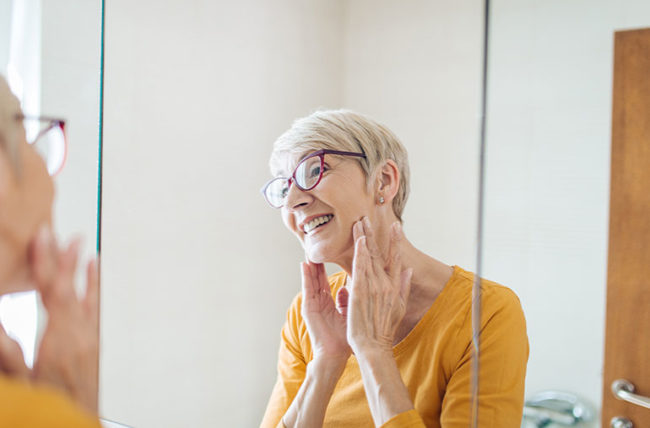Tel.: +86 159 2031 3473
E-mail: manager@onugechina.com
Tel.: +86 159 2031 3473
E-mail: manager@onugechina.com

If life is about change, skin is proof. How your skin ages depend on such factors like your lifestyle, diet, heredity, and personal habits.
To better understand the causes behind skin aging and what you can — and can’t — do to control how your skin ages
What are the visible signs of aging skin?
As we age, skin visibly changes in several ways, and a lot of it has to do with things beyond our control. As we age, skin becomes:
● Rough, dry, and itchy.
● Slack. The loss of the elastic tissue (elastin and collagen) in the skin with age causes your skin to become slack and hang loosely.
● Transparent. This is caused by thinning of the epidermis (surface layer of the skin) and dermis (deeper layer of the skin).
● Fragile. Increased skin fragility is caused by the flattening of the area where the epidermis and dermis (layer of skin under the epidermis) come together.
● More easily bruised. This is caused by thinner blood vessel walls.
● More prone to developing skin lesions, such as non-cancerous (benign) tumors.
What below-the-skin changes cause the aging seen in the face?
But the skin across your body isn't the only place it changes. Aging skin can also change the appearance of your face. Don't be alarmed, though, because it’s a natural part of aging.
Some factors include:
● Loss of fat below the skin (or what dermatologists call the subcutaneous layer) in your cheeks, temples, chin, nose, and eye area. This may result in loosening skin, sunken eyes, and a “skeletal” appearance.
● Bone loss may become evident after age 50 and cause slack skin and puckering of the skin around your mouth.
● Cartilage loss in the nose causes drooping of the nasal tip and makes the bony structures in the nose easier to see.
How does the sun cause aging of the skin (photoaging)?
We’ve all heard how overexposure to the sun can enhance aging in our skin, but how, exactly does it happen? Over time, the sun’s ultraviolet (UV) light damages certain fibers in the skin called elastin.
The skin also bruises and tears more easily and takes longer to heal. So while sun damage may not show when you’re young, it will later in life.
Nothing can completely undo sun damage, although the skin can sometimes repair itself. When you do go out, using sunscreen with SPF 30 or higher can protect your skin.
In addition, reapplying sunscreen every two hours or sooner if you get wet or sweat heavily will make an even bigger difference.
What other factors cause changes to your skin?
There are plenty of other reasons your skin ages as you get older, though.
Gravity. When the skin loses its elasticity, gravity causes drooping of the eyebrows and eyelids, looseness and fullness under the cheeks and jaw (jowls and “double chin”), and a lengthening of the ear lobes.
Obesity. Excess weight causes the skin to stretch and decreases the strength and luster of the hair and nails. It also causes skin conditions including dark patches on the skin (acanthosis nigricans), growths that stick out from the skin (skin tags), stretch marks, and varicose veins.
Obesity has been linked to other skin conditions, including psoriasis and cellulitis. Although patches of psoriasis (itchy, dry, red patches) can occur anywhere in the body, they frequently develop on the scalp or near the hairline. Folds of excess body skin can rub against each other and cause skin irritation, blisters, chafing, skin rashes, and skin infections.
Daily facial movements. Yes, laugh lines are (sort of) real. Lines on the face become more visible after the skin starts losing its elasticity, usually as people reach their 30s and 40s.
Sleeping position. How you sleep can play a role, too. Sleep creases are commonly seen on the side of the forehead, starting above the eyebrows to the hairline near the temples, as well as on the middle of the cheeks.
Smoking. People who smoke tend to have more wrinkles than nonsmokers of the same age, complexion, and history of sun exposure. The reason for this difference is unclear. It may be because smoking interferes with normal blood flow in the skin.
Dry and itchy skin. Dry skin is common in later life. About 85% of older people develop “winter itch,” because overheated indoor air is dry.
Dry skin itches because it is irritated easily. If your skin is very dry and itchy, this condition can affect your sleep, and cause irritability, it could be a symptom of a disease. For example, diabetes and kidney disease can cause itching. Some medicines make the itchiness worse. In that case, be sure to see your healthcare provider to see what the cause may be and any potential treatment possibilities.
CONTACT WITH SUPPORT TEAM
Navigation
Contact Us
Copyright © Guangzhou Magic Strips Family Bio-Technology Co., Ltd. All Rights Reserved |
Sitemap | Privacy Policy
